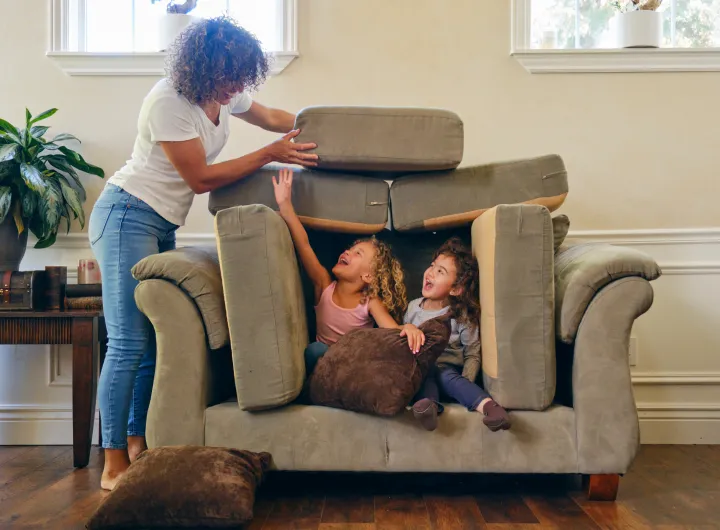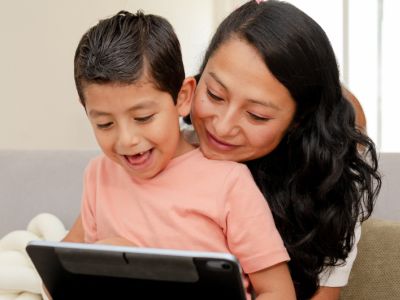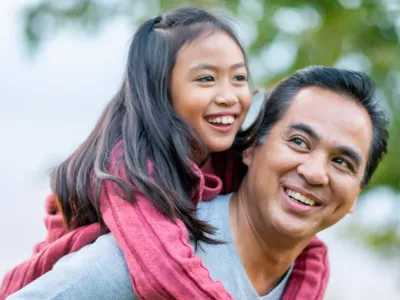5 friendship skills every child needs (and how to support kids using positive parenting)

Imagine your child comes to you and says, “No one will play with me.” Your heart sinks. It’s perfectly natural to want to jump in and fix it — but what’s the best way to teach kids about friendship?
We want our kids to make friends; to play and have fun, but we also want them to be confident when challenges arise. Triple P research shows that kids who have healthy friendships not only have a warm relationship with their parents, but their parents also coach them through challenging situations and help them connect with their friends1.
There are 5 practical social skills to help kids make friends and navigate friendships. The good news is you’re likely already doing these things.
Friendship skill 1: Help your child be a good friend
Making friends starts with being kind and finding common interests. Children learn these social skills by watching how we do it (role modelling), and through their own life experience. They develop these skills at their own pace, and some children may need more guidance than others.
Talking about what a good friend looks like in your everyday conversations can help. Ask your child what they think a good friend does: Is it letting others join in their game? Listening to ideas from other kids? Notice and praise kids when they do these things and share what you like about your friends.
As kids get older, talks can get more detailed. You could share some of your lighter friendship problems and how you might handle them by listening, solving problems and compromising. Seeing that the friendship journey isn’t always smooth can help kids cope with challenges, too.
Friendship skill 2: Taking turns
Taking turns, whether it’s taking part in a game or conversation, is an important play and social skill. Kids need to learn to wait, manage their frustrations and speak up.
You’re teaching this valuable skill when you play 'I spy' in the car or take turns talking at a family meal. For kids who are struggling, consider their age, abilities and strengths. While it might be challenging to expect toddlers to share their favourite toy, you could try a short game like rolling a ball back and forth.
Preschoolers and primary school kids can practise taking turns through play dates. This is an opportunity to set up a game, explain the rules, stay close (if needed) and praise kids when they get it right.
Competitive games are fine for some kids, but may be too stressful for others, who may be sensitive, have disabilities or be neurodivergent. You could consider cooperative board games or arts and crafts where no one ‘wins’. You know your child best, so choose games that are challenging, but not too hard for them.
Friendship skill 3: Listening
Listening is more than just waiting to talk; it’s showing that you’ve heard and understood, with our bodies and our words. This is called active listening.
As parents and caregivers, you’re teaching children through everyday interactions. When you actively listen to your child, they learn to listen to others. When children complain, “They’re not my best friend anymore!” Take a moment to just listen and reflect what they have said. Identify any feelings if you can. It might sound like, “You’re feeling sad that Alexa’s not your best friend anymore.” Not only are you role-modelling good listening skills, it also shows you have really heard them and that you value what they have to say.
Many families find that having a regular time to talk — like at bedtime or on the way to school — creates natural moments for listening. It builds your bond and boosts children’s mental health as they share their thoughts and dreams.
Friendship skill 4: Understanding other people’s perspectives
Empathy is a complex social skill children develop as they grow. Babies and young children may cry or laugh when others do, and that’s just the start of how empathy develops. Most children can start to understand how others feel around the age of 4 or 52.
If your child is upset about something, for example they may say, “They didn't invite me to their birthday party,” this can make you feel upset, too. Take a breath and validate your child’s feelings by saying something like, “It sounds like you're feeling left out.” Listen to what they share.
Gently help them think about why it might have happened. Maybe the party was small. This helps them see there may be different reasons for their friend’s choice and teaches them to be flexible in how they think about things and to be hopeful, too. If you feel upset, remember to plan some time to recharge or debrief with a friend or partner.
Friendship skill 5: Resolving conflicts
What if friendship dramas can be reframed as a sign that kids are developing as they should? Children need to learn how to disagree and make up; it’s part of growing up. Some kids might struggle to find the right words and need a prompt. It’s important to notice when they do this well and praise them for it.
Think about how you handle disagreements at home. Children learn so much by watching us express our views and find compromise. It’s okay to have everyday arguments at home, the key is for children to see arguments being resolved. (Serious arguments aren’t suitable for kids to watch.)
When primary school kids have a friendship conflict, try taking a step back. They can often handle more than we realise. Encourage them to find solutions by asking, “I wonder what you would do if this happened again?” or “What might you say tomorrow?” This helps them think it through. Plus, kids are more likely to act on ideas they came up with themselves.
The bottom line? Positive parenting can help
If you’re worried about your child’s mental health, you’re not alone. Help is available. Talk to your child’s teacher, your doctor or a health professional. Support is also available through Kids Help Phone.
Learn through our structured, online course
Every parent can benefit from evidence-based strategies to support their child. For families of children aged 12 and under, Triple P Online can help. For children aged 6 years and over with anxiety, there is Fear-Less Triple P Online. For support with teens, you could try Teen Triple P Online.
References
- Boyle, C., Sanders, M. R., Ma, T., Hodges, J., Allen, K.-A., Cobham, V. E., Darmawan, I., Dittman, C. K., Healy, K. L., Hepburn, S.-J., MacLeod, L. M., Teng, J., & Trompf, M. (2023). The thriving kids and parents schools project: Protocol of an incomplete stepped wedged cluster randomised trial evaluating the effectiveness of a Triple P seminar series. BMC Public Health, 23(1), Article 2021. https://doi.org/10.1186/s12889-023-16962-4
- Simon, P., & Nader-Grosbois, N. (2023). Empathy in Preschoolers: Exploring Profiles and Age- and Gender-Related Differences. Children, 10(12), 1869. https://doi.org/10.3390/children10121869

